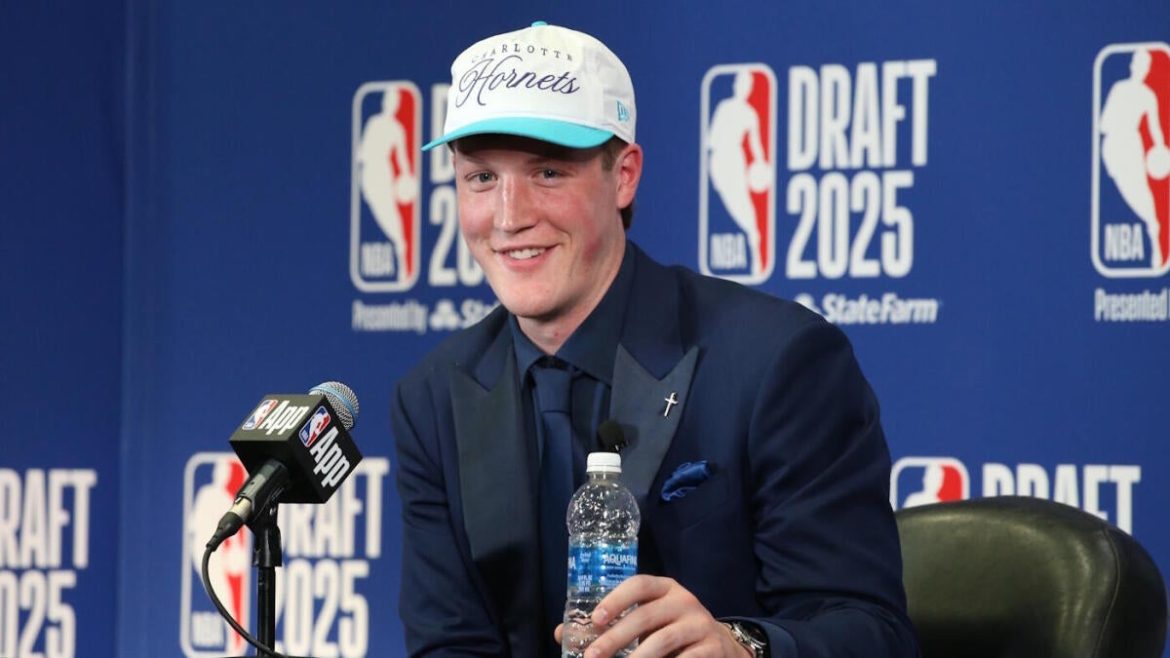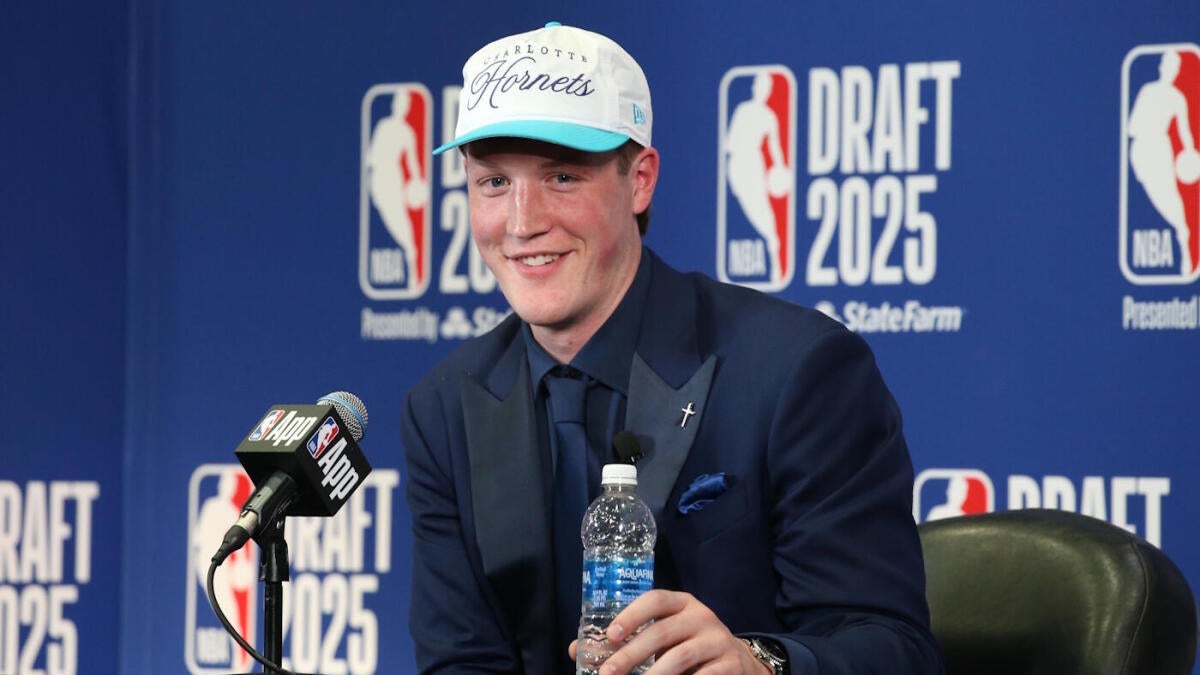The Charlotte Hornets’ 2025 NBA Draft strategy centered prominently on Duke sharpshooter Kon Knueppel, who was selected fourth overall, after missing out on the top prospect Cooper Flagg. This decision has sparked a notable conversation among analysts, fans, and sports executives regarding the team’s direction, priorities, and the potential impact of picking Knueppel over Flagg. Examining the Hornets’ choice, the attributes of Knueppel, and the broader implications for the franchise paints a revealing picture of an organization balancing immediate needs, long-term development, and team identity.
The Missed Opportunity: Cooper Flagg and the No. 1 Pick
The NBA Draft lottery denied the Hornets the coveted first overall pick, which many expected would be used on Cooper Flagg, a highly-touted Duke wing known for his versatile skill set and potential as a franchise-changing player. Flagg’s combination of athleticism, defensive prowess, and playmaking creates a tantalizing prospect, making him the likely number one overall pick by the Dallas Mavericks. The Hornets’ failure to secure this pick put them in a challenging spot, prompting executive decisions focused on alternative elite talents still available.
Flagg’s draft stock has been skyrocketing due to his two-way potential, which is a rare commodity in today’s NBA. His ability to guard multiple positions, coupled with his offensive versatility, makes him a coveted asset for any team looking to build a championship contender. The Hornets, however, found themselves in a position where they had to weigh the immediate needs of their roster against the long-term potential of a player like Flagg. This dilemma is not uncommon in the NBA, where teams often have to choose between a high-ceiling prospect and a player who can contribute immediately.
Why Kon Knueppel? The Sharpshooting Specialist
Knueppel’s appeal lies in his exceptional shooting ability and basketball IQ, highlighted by a 40.6% success rate from three-point range—numbers that placed him firmly among the most efficient long-range shooters in this draft class. ESPN analysts have drawn comparisons between Knueppel and some historic NBA sharpshooters, emphasizing his precise shooting touch and potential to stretch defenses. The Hornets’ executive vice president of basketball operations, Jeff Peterson, praised Knueppel’s shooting as superior to that of Flagg’s, underscoring a strategic preference for improving perimeter scoring.
Apart from pure shooting, Peterson emphasized that Knueppel’s game extends beyond just scoring. His averages during key Duke games without Flagg—17.5 points, six rebounds, and three assists—illustrate his ability to impact various facets on the court. Although questions remain over his defensive capabilities, the Hornets appear confident in developing that aspect of his game while leveraging his offensive versatility.
Knueppel’s shooting prowess is particularly valuable in today’s NBA, where spacing and three-point shooting are crucial components of successful offenses. His ability to shoot efficiently from beyond the arc will not only open up driving lanes for his teammates but also force defenses to respect his shot, creating more opportunities for the Hornets’ playmakers. This aspect of his game aligns perfectly with the modern NBA’s emphasis on perimeter scoring and floor spacing.
Strategic Fit: Meeting the Hornets’ Needs and Building Identity
The Hornets have struggled with three-point shooting over recent seasons, ranking poorly in this critical modern basketball category. Selecting Knueppel directly addresses this weakness, potentially transforming their offensive spacing and opening up driving lanes for other players. Beyond statistics, the front office views Knueppel as a player who fits their system and culture, offering immediate contributions while growing alongside the existing core.
Peterson has suggested that Knueppel’s developmental trajectory matches the Hornets’ timetable and ambitions. Unlike more raw prospects, Knueppel’s polished shooting and basketball IQ mean he comes in ready for NBA minutes while retaining room for growth. This considered risk-reward balance likely influenced the decision not to pursue a trade-down or seek other prospects like Ace Bailey, whose draft buzz the Hornets reportedly assessed as possibly overstated.
The Hornets’ decision to select Knueppel also reflects a broader trend in the NBA, where teams are increasingly valuing shooting and skill development over raw athleticism. This approach has been successful for teams like the Golden State Warriors and the Milwaukee Bucks, who have built their rosters around elite shooters and playmakers. By prioritizing Knueppel’s shooting ability, the Hornets are signaling their intent to adopt a similar philosophy, one that emphasizes spacing, ball movement, and efficient scoring.
Comparisons and Contrasts: Knueppel vs. Flagg
While Cooper Flagg is widely viewed as the more dynamic and potentially transformative talent, Knueppel offers consistency and a refined skill set that’s somewhat rarer in rookies. Flagg’s defensive versatility and athletic ceiling may mark him as the future cornerstone, but his offensive game is still evolving. Knueppel, conversely, arrives with a ready-made elite skill—the three-pointer—that the Hornets desperately need.
This contrast illustrates two competing team-building philosophies: chase a high-ceiling, multifaceted star with potential growing pains (Flagg), or secure a complementary, high-impact role player with durable skills (Knueppel). Jeff Peterson’s public comments reflect a preference for the latter at this juncture, emphasizing the value of Knueppel’s shooting and readiness.
The Hornets’ decision to prioritize Knueppel’s shooting over Flagg’s athleticism and defensive versatility is a calculated risk. While Flagg may have a higher ceiling, Knueppel’s immediate impact and polished skill set make him a safer bet for a team looking to rebuild. This approach is not without precedent, as teams like the Toronto Raptors have successfully built championship contenders by prioritizing shooting and skill development over raw athleticism.
Potential Challenges and Expectations
Knueppel’s defensive capabilities are under scrutiny, as transitioning to the NBA will test his physicality and agility on that side of the floor from day one. The Hornets’ coaching staff and development personnel must prioritize improving this dimension to ensure he becomes a well-rounded contributor. Moreover, the pressure of being a high lottery pick in a market hungry for success could impose expectations beyond his current maturity.
Team chemistry and fit with other Hornets players will also be crucial. Knueppel’s ability to space the floor should complement the playmakers and slashing guards on the roster, potentially unlocking stronger offensive synergy. His basketball IQ could enable him to absorb playbook complexities quickly and execute team strategies efficiently.
The Hornets’ decision to select Knueppel also comes with the expectation that he will be able to adapt to the NBA’s physicality and defensive demands. This will be a critical aspect of his development, as teams will likely target him defensively in an attempt to exploit any weaknesses. The Hornets’ coaching staff will need to work closely with Knueppel to improve his defensive fundamentals and help him become a more complete player.
Looking Ahead: Building a Premier NBA Franchise
The Hornets, under Jeff Peterson’s leadership, are signaling a cautious but optimistic approach to building a competitive squad. Landing Knueppel with the fourth pick symbolizes a commitment to developing players who can contribute immediately while possessing room to grow into star roles. His selection also echoes a broader NBA trend that prioritizes shooting and skill development, key components in today’s pace-and-space style.
The front office’s assessment suggests patience and prudence will shape the Hornets’ trajectory. Rather than chasing headline-grabbing names at all costs, there is a sense of constructing a balanced and versatile roster capable of competing both now and in the years ahead.
The Hornets’ decision to select Knueppel is a reflection of their long-term vision for the franchise. By prioritizing shooting and skill development, they are laying the foundation for a team that can compete in the modern NBA. This approach is not without its risks, but the potential rewards are significant. If Knueppel can develop into an elite shooter and contribute to the Hornets’ success, he could become a cornerstone of the franchise for years to come.
—
The Charlotte Hornets’ choice of Kon Knueppel over the more hyped Cooper Flagg reveals much about the franchise’s current mindset and objectives. While some may view missing out on Flagg as a setback, the Hornets’ leadership frames Knueppel’s elite shooting and basketball intelligence as the cornerstone of a thoughtfully crafted rebuild. This decision marks a strategic pivot emphasizing readiness, fit, and skill specialization—elements that could catalyze the Hornets’ rise if nurtured effectively.
Knueppel’s arrival brings hope of addressing the Hornets’ shooting woes and injecting a new dynamic into their offense, while leaving room for growth that aligns with the team’s future vision. Though challenges remain, including defensive development and adapting to NBA rigor, Charlotte’s front office appears confident that this calculated step will pay dividends, steering the team toward becoming a premier competitor in the league. The next few seasons will reveal how well Knueppel and the Hornets mesh, but the foundation of a promising new chapter is unmistakably being built.





